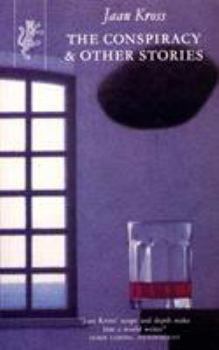Conspiracy
Select Format
Select Condition 
Book Overview
Six stories based around the time Estonians were slaves in their own home. This description may be from another edition of this product.
Format:Paperback
Language:English
ISBN:1860460062
ISBN13:9781860460067
Release Date:January 1995
Publisher:Harvill Press
Length:238 Pages
Weight:0.74 lbs.
Dimensions:0.8" x 5.3" x 8.4"
Customer Reviews
2 ratings
Reflection on the translation...
Published by Thriftbooks.com User , 17 years ago
I agree with everything A. Ross has said in his very thorough and astute review here, but I do disagree quite vehemently about the quality of the translation offered. While this may have been an accurate word-for-word translation of Kross's text, the prose is at times quite unreadable, almost embarrasingly so, undermining Kross's exceptional and important work. I only hope that readers will bear with this and read this collection because it is worthy of anyone's read, perhaps especially now, given our current climate. Again, this is a comment solely on the text's translation. It is not intended in any way to take away from A. Ross's excellent review. Please read it!
Estonia Under the Nazi/Soviet Yoke
Published by Thriftbooks.com User , 20 years ago
Kross is a well-known writer in Europe, and has been mentioned as a potential Nobel Prize winner at times. In these six stories he turns his attention to the plight of his native Estonia, during and after World War II. Throughout its history Estonia existed as a small principality passed back and forth between German and Russian hands, and the second World War proved to be an exaggerated microcosm of this fragile situation as the Germans conquered it in 1941, only to have it retaken by Soviet forces in 1944. Estonia's young men were conscripted into armies on both sides, and in one horrible instance, were forced to fight one another at the Battle of Velikiye Luki. The six stories here illustrate the complexities of trying to navigate and simply survive in such extreme times. Told with dark humor and pathos, they are gripping and tragic tales. The protagonist of each is Peeter Mirk, who ages from a young legal student to middle-aged intellectual over the course of the stories (which proceed chronologically from 1939 to the late 1950s). Mirk is a thinly veiled version of the author, with the same background and same experiences as Kross, who studied law, was imprisoned by the Germans for a time, spied on the Germans, and was then imprisoned for eight years by the Soviets in 1946. The first two stories ("The Wound" and "Lead Piping") outline attempts at the start of the war, when Estonia was occupied by the Soviets, to escape Germany and Finland. It was a time when a population of often very mixed lineage was forced to pick a side, and many with German backgrounds took up Hitler's invitation to emigrate, while many others sought freedom in Finland and further abroad. In both stories, Peeter encounters former classmates whom he tries to assist in getting abroad, only to see their efforts ending badly. The third story ("The Stahl Grammar") also starts with the tale of an ill-fated escape (this time Peeter's), but is more concerned with the status of imprisonment. The psychological games that are played by the German captors, and the mind's inability to stand of firm footing. The fourth and title story ("The Conspiracy") takes place entirely within a prison, this time under Soviet watch. Here, Kross describes all twenty or so cell mates and the "crimes" that got them here--a biting indictment of the Soviet era and the ideological correctness required at all times. As in the other stories, the smallest decisions or thoughtless acts end up having staggering repercussions in such times. "The Ashtray" continues the prison motif, here on a train to the gulag and a camp en route. The randomness and fickleness of fate places Peeter in the one place he might actually survive his sentence. Finally, "The Day His Eyes Are Opened" rounds things off rather weakly with an eavesdropped conversation in a train. An old woman's faith and resilience are on display as she goes to meet her husband, who is emerging from the gulag after ten years. It's presumably meant as a






